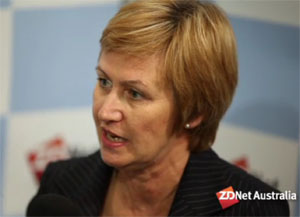Making technology core: Australian govt CIO on her legacy

Outgoing Australian government chief information officer (CIO) Ann Steward has overseen some of the biggest reforms in government IT, with technology now sitting at the core of government.

Steward, who is set to retire at the end of this year, was appointed to the CIO role within the Australian Government Information Management Office (AGIMO) by then Special Minister of State Eric Abetz in June 2005.
Steward told ZDNet that when she started, technology was just "acknowledged."
"Now it is an environment where technology is just so core to the business of government in its service delivery, in its own operations, in its ability to leverage technology and the capabilities to really contribute to the national productivity," she said.
In her time as CIO and leading AGIMO, the biggest task undertaken by the agency has been in leading the implementations of the Gershon Report, delivered by then Finance Minister Lindsay Tanner. The report was conducted by Sir Peter Gershon and released in 2008, setting off a massive overhaul of the use of government IT. The report estimated a saving of AU$1.5 billion over five years. Half of this money was originally supposed to go back to the agencies, but, prior to the 2010 federal election, Prime Minister Julia Gillard announced that AU$447.5 million of the saved amount would not be quarantined for IT projects, and agencies would instead have to bid for IT funding.
A report by Ian Reinecke into the government's implementation of the Gershon recommendations found that while substantial progress had been made, unrealistic expectations had been placed on AGIMO to lead and implement the change across government.
Two years on, Steward said that handling all of the tasks associated with the review, such as benchmarking, the datacentre strategy, workforce planning, industry codes of practice, reducing the number of supplier panels, and changing the way that government procurements take place, was very demanding on AGIMO.
"It was very demanding, it was done in a very short time frame," she said. "In terms of the expanse of what it was covering [and] that was happening at the same time as business-as-usual activities that were already underway.
"So juggling that at the same time was a pretty demanding task."
AGIMO now has 11 panels in place for the procurement of technology for government agencies. Steward said that this has resulted in greater clarity for industry in working with government, and has delivered significant cost savings to agencies.
"We need to make sure we get the best for our investment dollar, and that now has a good sense of maturity. It is hard work, but it is well operating."
Steward said that she recognises that the role of a departmental CIO has changed over the last seven years.
"They are still accountable and responsible for the delivery of complex technologies, but they also have growing demands on them to bring forth innovative options for the business to be able to take into account, to help in the upfront design of what programs might be, to be sure they will be implemented successfully," she said.
"[They have] a much stronger and deeper engagement with the business, so I think this real issue of the change from 'us and them' to the team that needs to be together to take forward these big new applications, these new modes of delivery."
Steward said that after her retirement, AGIMO will continue to push for savings through leveraging purchasing power of government, reuse of technology across government, and using the cloud more to deliver efficiencies.
"I think there are some real opportunity and challenge points that are there. There is going to be continued fiscal discipline that needs to be managed, and I am sure my colleagues are up to that," she said. "There is the continuing commoditisation of technology and a workforce that will be looking to exploit more of the mobile devices as it is appropriate in terms of supporting service delivery or other modes of interaction."
For her successor, Steward said that it is important to strike a balance between what AGIMO could lead itself, and what it should hand over to individual departments to lead.
"Critically, it is a balancing between those things that are centrally led or even delivered or managed [by AGIMO], versus where the capabilities are across our agencies to extend the lead agency model."
She said that negotiation skills would also be key.
"Be willing to listen, but, at the end of the day, take into account what the whole-of-government benefit will be and deliver in that context. And I would wish them well."
For the outgoing CIO, she said she is looking forward to taking an "absolute break."
"It has been a very full job for a number of years now, and I think it is important to make that full stop, and have your mindset cleared."